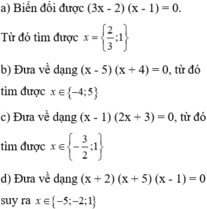
Hãy nhập câu hỏi của bạn vào đây, nếu là tài khoản VIP, bạn sẽ được ưu tiên trả lời.


a, Đặt pt trên là (1)
Nhận thấy : x = 0 không là nghiệm của (1)
Với x khác 0 , chia cả 2 vế của (1) cho \(x^2\) ta được :
\(2x^2+3x-1+\dfrac{3}{x}+\dfrac{2}{x^2}=0\)
\(\Leftrightarrow2\left(x^2+\dfrac{1}{x^2}\right)+3\left(x+\dfrac{1}{2}\right)-1=0\circledast\)
Đặt \(x+\dfrac{1}{x}=y\)
\(\Leftrightarrow\left(x+\dfrac{1}{2}\right)^2=y^2\)
\(\Leftrightarrow x^2+2x.\dfrac{1}{2}+\dfrac{1}{x^2}=4x^2\)
\(\Leftrightarrow x^2+\dfrac{1}{x^2}=4^2-2\)
\(\Rightarrow\circledast\Leftrightarrow2\left(y^2-2\right)+3y-1=0\)
\(\Leftrightarrow2y^2+3y-5=0\)
\(\Leftrightarrow2y^2-2y+5y-5=0\)
\(\Leftrightarrow\left(2y+5\right)\left(y-1\right)=0\)
\(\Leftrightarrow\left[{}\begin{matrix}y=\dfrac{-5}{2}\\y=1\end{matrix}\right.\)
\(\)+ Với \(y=\dfrac{-5}{2}\Rightarrow x+\dfrac{1}{x}=\dfrac{-5}{2}\)
\(\Leftrightarrow\dfrac{2x^2+2}{2x}=\dfrac{-5x}{2x}\)
\(\Leftrightarrow2x^2+5x+2=0\)
\(\Leftrightarrow2x^2+x+4x+2=0\)
\(\Leftrightarrow x\left(2x+1\right)+2\left(2x+1\right)=0\)
\(\Leftrightarrow\left(2x+1\right)\left(x+2\right)=0\)
\(\Leftrightarrow\left[{}\begin{matrix}x=\dfrac{-1}{2}\\x=-2\end{matrix}\right.\)
+ Với \(y=1\Rightarrow x+\dfrac{1}{x}=1\)
\(\Leftrightarrow\dfrac{x^2+1}{x}=\dfrac{x}{x}\)
\(\Leftrightarrow x^2+1=x\)
\(\Leftrightarrow x^2-x=-1\)
\(\Leftrightarrow x^2-2x.\dfrac{1}{2}+\dfrac{1}{4}=-1+\dfrac{1}{4}\)
\(\Leftrightarrow\left(x-\dfrac{1}{2}\right)^2=-\dfrac{3}{4}\)
=> Vô nghiệm
Vậy phương trình có tập nghiệm là \(S=\left\{-2;-\dfrac{1}{2}\right\}\)

b) 5x(x-2000)-x+2000=0
\(\Rightarrow5x\left(x-2000\right)-\left(x-2000\right)=0\\ \Rightarrow\left(x-2000\right)\left(5x-1\right)=0\)
\(\Rightarrow\left\{{}\begin{matrix}x-2000=0\\5x-1=0\end{matrix}\right.\Leftrightarrow\left\{{}\begin{matrix}x=0+2000\\5x=0+1\end{matrix}\right.\Leftrightarrow\left\{{}\begin{matrix}x=2000\\5x=1\end{matrix}\right.\Leftrightarrow\left\{{}\begin{matrix}x=2000\\x=\dfrac{1}{5}\end{matrix}\right.\)

\(3x^2-13x+4=0\)
\(\Leftrightarrow3x^2-12x-x+4=0\)
\(\Leftrightarrow\left(3x^2-12x\right)-\left(x-4\right)=0\)
\(\Leftrightarrow3x\left(x-4\right)-\left(x-4\right)=0\)
\(\Leftrightarrow\left(3x-1\right)\left(x-4\right)=0\)
\(\Leftrightarrow x=\dfrac{1}{3}\) hoặc \(x=4\)
ĐKXĐ: x khác 4
\(\dfrac{2x^3+5x^2-3x}{x^2-x-12}=0\)
\(\Leftrightarrow\dfrac{2x^3+6x^2-x^2-3x}{x^2+3x-4x-12}=0\)
\(\Leftrightarrow\dfrac{\left(2x^3+6x^2\right)-\left(x^2+3x\right)}{\left(x^2+3x\right)-\left(4x+12\right)}=0\)
\(\Leftrightarrow\dfrac{2x^2\left(x+3\right)-x\left(x+3\right)}{x\left(x+3\right)-4\left(x+3\right)}=0\)
\(\Leftrightarrow\dfrac{\left(2x^2-x\right)\left(x+3\right)}{\left(x-4\right)\left(x+3\right)}=0\)
\(\Leftrightarrow\dfrac{2x^2-x}{x-4}=0\)
\(\Leftrightarrow\dfrac{x\left(2x-1\right)}{x-4}=0\)
\(\Leftrightarrow x\left(2x-1\right)=0\)
\(\Leftrightarrow x=0\) hoặc \(x=\dfrac{1}{2}\)

1/
a/ \(D=2x\left(10x^2-5x-2\right)-5x\left(4x^2-2x-1\right)\)
\(D=2x\left[10\left(x^2-\frac{1}{2}x-\frac{1}{5}\right)\right]-5x\left[4\left(x^2-\frac{1}{2}x-\frac{1}{4}\right)\right]\)
\(D=20x\left(x^2-\frac{1}{2}x-\frac{1}{5}\right)-20x\left(x^2-\frac{1}{2}x-\frac{1}{4}\right)\)
\(D=20x^3-10x^2-4x-20x^3+10x^2+5x\)
\(D=x\)
b/ Mình xin sửa lại đề:
Tính giá trị biểu thức \(E\left(x\right)=x^5-13x^4+13x^3-13x^2+13x+2012\)
Tại x = 12
\(E\left(x\right)=x^5-\left(x+1\right)x^4+\left(x+1\right)x^3-\left(x+1\right)x^2+\left(x-1\right)x+2012\)
\(E\left(x\right)=x^5-x^5-x^4+x^4+x^3-x^3-x^2+x^2-x+2012\)
\(E\left(x\right)=2012-x\)
\(E\left(x\right)=2000\)
2/
a/ \(2x\left(x-5\right)-x\left(3+2x\right)=26\)
<=> \(2x^2-10x-3x-2x^2=26\)
<=> \(-13x=26\)
<=> \(x=-2\)
b/ Bạn vui lòng coi lại đề.
3a/ Ta có \(D=x\left(5x-3\right)-x^2\left(x-1\right)+x\left(x^2-6x\right)-10+3x\)
\(D=5x^2-3x-x^3+x^2+x^3-6x^2-10+3x\)
\(D=-10\)
Vậy giá trị của D không phụ thuộc vào x (đpcm)

\(a,=\left(2x^4-2x^3+2x^2+3x^3-3x^2+3x-2x^2+2x-2\right):\left(x^2-x+1\right)\\ =\left(x^2-x+1\right)\left(2x^2+3x-2\right):\left(x^2-x+1\right)\\ =2x^2+3x-2\\ b,=\left(6x^2+15x-2x-5\right):\left(2x+5\right)\\ =\left(2x+5\right)\left(3x-1\right):\left(2x+5\right)=3x-1\\ c,=\left(2x^4-6x^2+x^3-3x+x^2-3\right):\left(x^2-3\right)\\ =\left(x^2-3\right)\left(2x^2+x+1\right):\left(x^2-3\right)=2x^2+x+1\)


a) \(\left(x^2-3x+1\right)\left(x^2+5x+1\right)=2x^2\)
\(\Rightarrow\)Cậu xem lại đề xem có sai chỗ nào không nhé !
b) \(x^4-9x\left(x^2-2\right)+16x^2+4=0\)
\(\Leftrightarrow x^4-9x^3+18x+16x^2+4=0\)
\(\Leftrightarrow x^4-4x^3-2x^2-5x^3+20x^2+10x-2x^2+8x+4=0\)
\(\Leftrightarrow x^2\left(x^2-4x-2\right)-5x\left(x^2-4x-2\right)-2\left(x^2-4x-2\right)=0\)
\(\Leftrightarrow\left(x^2-4x-2\right)\left(x^2-5x-2\right)=0\)
\(\Leftrightarrow\orbr{\begin{cases}x^2-4x-2=0\\x^2-5x-2=0\end{cases}\Leftrightarrow}\orbr{\begin{cases}x=2\pm\sqrt{6}\\x=\frac{5\pm\sqrt{33}}{2}\end{cases}}\)
Vậy tập nghiệm của phương trình là : \(S=\left\{2\pm\sqrt{6};\frac{5+\sqrt{33}}{2}\right\}\)
b) \(ĐKXĐ:x\ne1;x\ne\frac{2}{3}\)
\(\frac{2x}{3x^2-5x+2}+\frac{13x}{3x^2+x+2}=0\)
\(\Leftrightarrow\frac{2x\left(3x^2+x+2\right)+13x\left(3x^2-5x+2\right)}{\left(3x^2-5x+2\right)\left(3x^2+x+2\right)}=0\)
\(\Leftrightarrow\frac{6x^3+2x^2+4x+39x^3-65x^2+26x}{\left(3x^2-5x+2\right)\left(3x^2+x+2\right)}=0\)
\(\Leftrightarrow45x^3-63x^2+30x=0\)
\(\Leftrightarrow3x\left(15x^2-21x+10\right)=0\)
\(\Leftrightarrow\orbr{\begin{cases}x=0\left(tm\right)\\15x^2-21x+10=0\left(ktm\right)\end{cases}}\)
Vậy x = 0 là nghiệm của phương trình.

a, Xét x=0 không phải nghiệm pt chia 2 vế cho x2 , đặt t= x+1/x từ đó suy ra phương trình ẩn t, giải ra ta được các phương trình ẩn x rồi ra x.
b, Tách đa thức thành tích của đơn thức (x+1) và 1 đa thức bậc 4 rồi làm như câu a,.
\(2x^4+3x^3-x^2+3x+2=0\)
\(\Leftrightarrow2x^4+4x^3-x^3-2x^2+x^2+2x+x+2=0\)
\(\Leftrightarrow2x^3.\left(x+2\right)-x^2.\left(x+2\right)+x.\left(x+2\right)+\left(x+2\right)=0\)
\(\Leftrightarrow\left(x+2\right).\left(2x^3-x^2+x+1\right)=0\)
\(\Leftrightarrow\left(x+2\right).\left(2x^3+x^2-2x^2-x+2x+1\right)=0\)
\(\Leftrightarrow\left(x+2\right).\left(2x+1\right).\left(x^2-x+1\right)=0\)
\(\Leftrightarrow\orbr{\begin{cases}x+2=0\\2x+1=0\end{cases}\Rightarrow\orbr{\begin{cases}x=-2\\x=-\frac{1}{2}\end{cases}}}\)
\(\text{Vì }x^2-x+1=x^2-x+\frac{1}{4}+\frac{3}{4}=\left(x-\frac{1}{2}\right)^2+\frac{3}{4}\ge\frac{3}{4}\)
Vậy phương trình có nghiệm \(S=\left\{-2,-\frac{1}{2}\right\}\)